|
|
|
Sort Order |
|
|
|
Items / Page
|
|
|
|
|
|
|
| Srl | Item |
| 1 |
ID:
050597
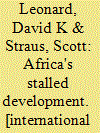

|
|
|
|
|
| Publication |
Boulder, Lynne Rienner Publishers, 2003.
|
| Description |
xi, 159p.
|
| Standard Number |
1588261166
|
|
|
|
|
|
|
|
|
|
|
|
Copies: C:1/I:0,R:0,Q:0
Circulation
| Accession# | Call# | Current Location | Status | Policy | Location |
| 047715 | 338.967/LEO 047715 | Main | On Shelf | General | |
|
|
|
|
| 2 |
ID:
059035


|
|
|
|
|
| Publication |
Jan-Feb 2005.
|
| Summary/Abstract |
As western Sudan continues to suffer, much international attention has focused on whether to call what is happening there "genocide." Yet once the term was invoked, it did not trigger outside intervention. Terminology turns out to matter far less than was expected. And once more, the world has dithered while people die.
|
|
|
|
|
|
|
|
|
|
|
|
|
|
|
|
| 3 |
ID:
104871
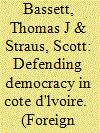

|
|
|
| 4 |
ID:
114672
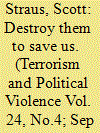

|
|
|
|
|
| Publication |
2012.
|
| Summary/Abstract |
Based on an analytic review of recent scholarly advances in genocide studies, this article investigates the causes, concept, and logic of genocide while suggesting a set of theoretical propositions and avenues for future research. Two emerging theoretical streams of literature on causes-strategic and ideological-highlight different dimensions of genocide and should be thought of as compatible. The study of genocide should be embedded in a broader study of political violence; the two literatures have been strangely cloistered from each other. To that end, genocide should be conceptualized as group-selective, large-scale violence whose purpose is group destruction. This stands in contrast to violence that is individually selective or indiscriminate; small-scale and not sustained across time and space; and whose purpose is repression, communication, or some other outcome short of group destruction. To develop existing theory and to bring the study of genocide closer to the literature on violence, studying variation in outcomes is essential; that is, students of genocide should ask why genocide and not another outcome occurs, rather than only studying common patterns among genocide cases. Similarly, rather than study primarily sources of escalation and accelerators of violence, scholars should also theorize restraint and decelerators of violence. Further, scholars of genocide should focus attention on the interaction between national and sub-national actors as well as periods of escalation or de-escalation. In these ways and others proposed in the essay, genocide studies can build on recent gains and develop a broader and more coherent field of theoretical inquiry.
|
|
|
|
|
|
|
|
|
|
|
|
|
|
|
|
| 5 |
ID:
121588
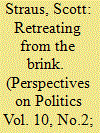

|
|
|
|
|
| Publication |
2012.
|
| Summary/Abstract |
The research problem driving this paper is the absence of a strong theory that accounts for variation among cases that have similar probabilities of escalating to genocide and similar forms of organized (usually state-led) mass violence against civilians. Much of the existing theory on genocide focuses on explaining under what conditions and by what processes regimes commit large-scale violence against civilians. I argue that a critical missing dimension to studies of genocide, but also more generally to the study of political violence, is a methodological recognition of negative cases and a theoretical recognition of the dynamics of restraint that helps to explain such negative cases. That is, in addition to asking what causes leaders to choose to escalate violence, I argue that scholars should emphasize conditions that prompt moderation, de-escalation, or non-escalation. I propose an alternative framework for how to conceptualize the process of political violence and review the literature to identify key restraint mechanisms at micro, meso, and macro levels of analysis. I further articulate a provisional theory of genocide using this new analytical framework. I illustrate my argument with an empirical analysis of mass violence cases in Sub-Saharan Africa since independence, and with a more in-depth analysis of comparable crises in Rwanda and Côte d'Ivoire, where the trajectories of violence differed significantly. While this paper draws on extensive empirical research, my primary purpose is not to advance a developed new theory or to test particular hypotheses, but rather to outline a research agenda that promises to draw from and contribute to recent work on the comparative politics of violence.
|
|
|
|
|
|
|
|
|
|
|
|
|
|
|
|
| 6 |
ID:
112123
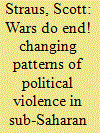

|
|
|
|
|
| Publication |
2012.
|
| Summary/Abstract |
Contrary to common assumption, major forms of large-scale organized political violence in sub-Saharan Africa are declining in frequency and intensity, and the region is not uniquely prone to the onset of warfare. African civil wars in the late 2000s were about half as common compared to the mid-1990s. The character of warfare has also changed. Contemporary wars are typically small-scale, fought on state peripheries and sometimes across multiple states, and involve factionalized insurgents who typically cannot hold significant territory or capture state capitals. Episodes of large-scale mass killing of civilians are also on the decline. That said, other forms of political violence that receive less attention in the academic literature are increasing or persistent. These include electoral violence and violence over access to livelihood resources, such as land and water. While primarily descriptive, the article posits that geo-political shifts since the end of the Cold War are a leading candidate to explain the changing frequency and character of warfare in sub-Saharan Africa.
|
|
|
|
|
|
|
|
|
|
|
|
|
|
|
|
| 7 |
ID:
079918


|
|
|
|
|
| Publication |
2007.
|
| Summary/Abstract |
The importance of hate radio pervades commentary on the Rwandan genocide, and Rwanda has become a paradigmatic case of media sparking extreme violence. However, there exists little social scientific analysis of radio's impact on the onset of genocide and the mobilization of genocide participants. Through an analysis of exposure, timing, and content as well as interviews with perpetrators, the article refutes the conventional wisdom that broadcasts from the notorious radio station RTLM were a primary determinant of genocide. Instead, the article finds evidence of conditional media e fects, which take on significance only when situated in a broader context of violence
|
|
|
|
|
|
|
|
|
|
|
|
|
|
|
|
|
|
|
|
|